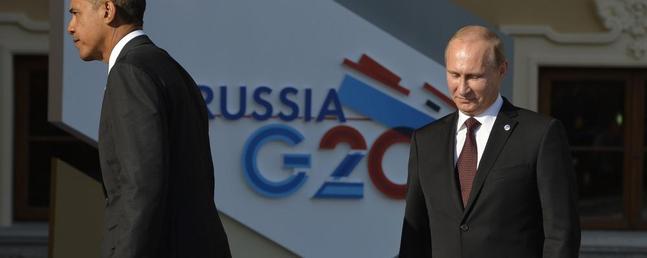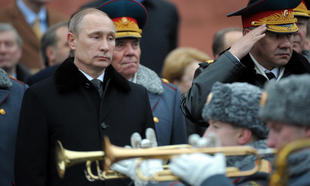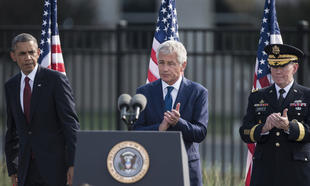(Come scrivo sempre: colpa di Obama, il pavido, se succederà qualcosa di grosso ...)
![Emoticon [:27]](./images/smilies/UF/27.GIF)
Obama sta perdendo la (nuova) Guerra Fredda
La Casa Bianca ha una politica estera troppo prudente. E Vladimir Putin ne approfitta: dall'Ucraina alla Siria, passando per l'Iran
Immagine: 15,54 KB
15,54 KBPer i critici, la politica di Barack Obama nei confronti della Russia è un fallimento. Nell'ultimo anno, Vladimir Putin ha giocato sempre le mosse giuste, in anticipo, o in risposta, rispetto a quelle fatte dal presidente Usa. La strategia della Casa Bianca, improntata sulla cautela, alla fine, è apparsa troppo timida, se non debole, nei confronti delle decise e (a volte) aggressive azioni del Cremlino su tutti i terreni di gioco sui quale Mosca e Washington si sono confrontati: Siria, Iran e Ucraina.
Per i repubblicani non c'è alcun dubbio: gli Stati Uniti stanno perdendo la nuova Guerra Fredda con la Russia. Putin gioca al gatto e al topo con Obama. Si muove meglio e con maggiore rapidità, con una superiore lucidità rispetto agli obiettivi da cogliere: non perdere peso politico, ma anzi, recuperarne e averne sempre di più nelle regioni storicamente sotto l'influenza di Mosca. La (nuova) Grandezza della Russia (ri)passa attraverso l'antagonismo con gli Stati Uniti. Putin lo coltiva. Obama cerca di smorzarlo, ma sembra essere sempre un passo indietro rispetto alle mosse dell'avversario. Non solo perde terreno, ma anche credibilità. La cautela appare indecisione.
Siria
La Casa Bianca afferma ora che la minaccia di bombardare le strutture militari del regime siriano sia stato il motivo per cui Bashar al-Assad ha smantellato il suo arsenale chimico. In realtà, come si sa, la storia è andata diversamente. Obama era in procinto di dare l'ordine di un attacco già pronto e pianificato, ma si è fermato all'ultimo momento, quando ha visto la ferma opposizione dell'Onu e della sua pubblica opinione a un nuovo impegno bellico americano. Una marcia indietro forzata, a cui è stato costretto anche dalle mosse di Vladimir Putin.
Alle Nazioni Unite, Mosca si è opposta con decisione a ogni risoluzione che desse il via libera all'azione militare. Poi, ha sponsorizzato, facendola sua, una proposta di soluzione diplomatica (eliminazioni delle armi chimiche in cambio di uno stop all'attacco) che in realtà era stata messa sul tavolo da un disperato John Kerry. La via d'uscita "offerta" da Mosca è diventato così un vero e proprio schiaffo di Putin a Obama. Il presidente russo era riuscito con la diplomazia laddove il reclutante guerriero Obama voleva arrivare con i missili e le bombe. Un successo d'immagine non da poco per il Cremlino. Ma non solo. Soprattutto la Russia ha così evitato la sconfitta dell'unico regime arabo amico - paese ospitante dell'unica base navale russa al di fuori dei confini nazionali e grande importatore delle sue armi - e ha rivitalizzato la sua influenza politica in Medioriente.
Iran
Barack Obama punta sul rispetto dell'intesa sul nuclare siglata a Ginevra dai 5+1 per allontanare lo spettro di un atomica degli Ayatollah. I repubblicani credono che questa via sia troppo rischiosa: gli iraniani potrebbero usare l'accordo per prendere tempo e arrivare al loro obiettivo. Per questo i più moderati vorrebbero che il Congresso approvasse una nuovo pacchetto di sanzioni contro Teheran, mentre i più radicali pensano che non ci sia (sarà) altra via da seguire se non quella indicata spesso dal governo israeliano: bombardare i siti nucleari iraniani.
Immagine: 14 KB
14 KBputin ALEXEI DRUZHININ
Vladimir Putin Getty Imagines Alexey Druzhinin
Vladimir Putin si è infilato con abilità in questo ginepraio. E mentre Obama agiva con cautela, lui si è preso con decisione il suo spazio. Ora Mosca e Teheran sono molto più vicine che in passato. Entrambe appoggiano il regime siriano di Assad ed entrambe hanno un obiettivo strategico: limitare la presenza degli Usa nella regione. Se una volta erano concorrenti sul fronte energetico, ora invece hanno stretto una tattica alleanza: poco tempo fa hanno siglato un accordo "petrolio in cambio di cibo" che ha rotto il fronte delle sanzioni imposte dagli Stati Uniti. Ma soprattutto Mosca vuole vendere armi e tecnologia per il nucleare (civile) a Teheran. Per suggellare questa "amicizia", Putin potrebbe recarsi in Iran per una visita ufficiale. Incurante dei cauti tentativi americani di isolare e indebolire il regime degli ayatollah.
Ucraina
Barack Obama ha ammonito la Russia a non compiere azioni azzardate in Ucraina. Ma la risposta arrivata è stata ben chiara: l'occupazione da parte di uomini armati degli aeroporti della Crimea è il segnale che Mosca non intende mollare la presa sulla strategica penisola. Anzi, è prevedibile che le spinte secessioniste saranno alimentate. La Casa Bianca non può fare molto. Anche in questo caso ha agito con ritardo. Putin è in vantaggio nella gioco ucraino. Secondo alcuni esperti, l'intelligence russa avrebbe depistato quelle occidentali, facendo credere che lo showdown a Kiev era molto più lontano. La reazione degli Usa e dell'Europa sono così arrivate fuori tempo massimo, inadeguate per governare una crisi che potrebbe portare alla divisione del paese.
La Casa Bianca ora può fare pressioni sul Cremlino, ma è difficile pensare che Putin cambi rotta. In realtà, le armi di Obama sono spuntate. Può appoggiare il nuovo governo di Kiev a suon di dollari. Denaro che potrebbe cementare il nuovo regime, ma non certo evitare che Mosca faccia sentire tutto il suo peso in Ucraina e che,alla fine, si tenga la russofona Crimea, con le sue fondamentali basi navali.
Datagate
Anche Edward Snowden è uno delle armi di questa Guerra Fredda. L'uomo che ha rivelato i segreti del sistema di spionaggio e di sorveglianza della Nsa si trova in Russia da mesi, ospitato dalle autorità moscovite. Per molti non è un caso che il giovane analista abbia fatto scoppiare lo scandalo subito dopo essere fuggito alla volta di Hong Kong e che poi si sia diretto in Russia, dove è stato accolto.
Immagine: 13,35 KB
13,35 KBobama putin brendan smiailowsky
Barack Obama e Chuck Hagel Getty Imagines Brendan Smialowsky
Il Datagate ha prodotto un profondo danno d'immagine e politico a Barack Obama. Le tensioni, nate dopo le rivelazioni sul fatto che gli Usa spiavano i loro nemici, ma anche e soprattutto di amici e di alleati, non sono ancora terminate. Con l'ospitalità e l'aiuto offerto a Edward Snowden, Vladimir Putin ha contribuito (e non poco) a infliggere il colpo all'America di Obama. Non è un caso che subito dopo lo scoppio del Datagate, le ostilità tra Washington e Mosca siano aumentate, tanto da indurre Obama a cancellare un incontro bilaterale con il collega russo.
Attenzione al nuovo isolazionismo
Per la prima volta, il Segretario di Stato John Kerry ha messo in guardia dal pericolo di un nuovo isolazionismo americano. "Gli Stati Uniti si stanno comportando come una piccola nazione". L'uscita è abbastanza sorprendente. Solo poco tempo fa, Kerry aveva espresso un giudizio opposto. Pur difendendo l'operato dell'amministrazione di cui fa parte, pur negando che gli Stati Uniti si stiano ritirando dalle aree di crisi nel mondo, l'ex candidato alla Casa Bianca nel 2004, rispetto al passato, ora, invece, è stato netto nel dire che gli americani pensano troppo al loro posto di lavoro, alla loro economia e ai loro interessi e non riescono più a vedere la connessione tra questi e il ruolo che gli Usa hanno nel mondo.
John Kerry parlava dei tagli imposti al Dipartimento di Stato. Forse si riferiva anche a quelli del Pentagono. Una diplomazia meno forte, un esercito ridotto. Da qui, dalla necessità di risparmiare, nascerebbe il "Nuovo Isolazionismo". Ma forse (e questo Kerry non lo dice) nasce anche dall'approccio seguito dalla Casa Bianca in politica estera. Cauto, prudente, a volte, appare quasi disinteressato. Come ha sottolineato il Guardian, nel suo ultimo Discorso sullo Stato dell'Unione, Obama non ha offerto alcuna visione strategica dell'America nel mondo. La presidenza post imperiale inizia qui, aveva scritto Simon Tisdall. Vladimir Putin è uno che l'ha capito. Per questo conquista punti ed è in vantaggio nel gioco della Nuova Guerra Fredda.
http://news.panorama.it/esteri/obamaman ... bama-putinLe guerre avvengono quando c'è uno "sbilanciamento" ...
![Occhiolino [;)]](./images/smilies/UF/icon_smile_wink.gif)
![Caldo [8D]](./images/smilies/UF/icon_smile_cool.gif)





